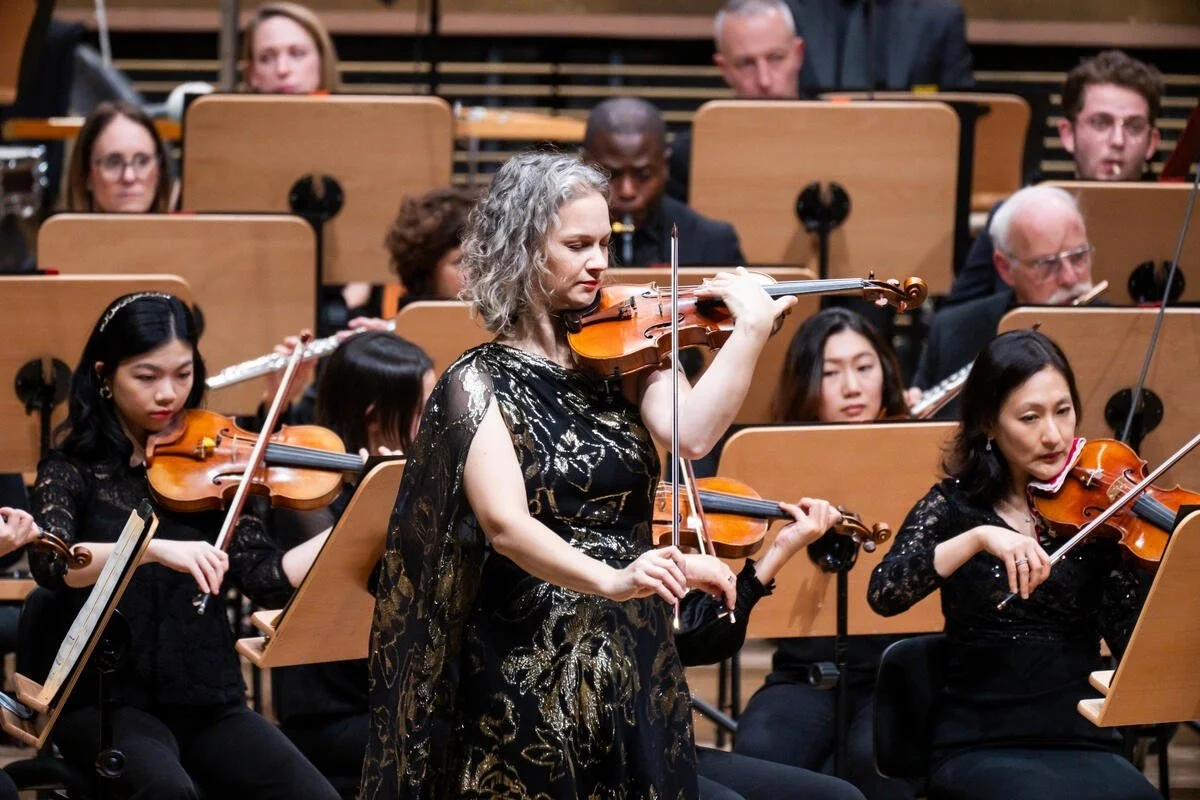REVIEW: Adams Conducts Adams at New York Philharmonic
Above photo by Chris Lee.
November 16, 2024
It has been suggested that composers shouldn’t conduct their own music. But, John Adams, whose Antony and Cleopatra will premiere at the Metropolitan Opera in the spring, disproved the theory, leading a thoroughly convincing and brilliantly played evening of mostly American twentieth- and twenty-first century compositions.
Each half of the program began with a forebear, and followed with music by a composer present in the room. Arvo Pärt’s Cantus in memoriam Benjamin Britten from 1977 served as a sort of liturgical prelude. The Estonian composer penned this tribute to Britten shortly following the British composer’s death. The meditative movement for strings and chime bears a sad, regretful tone constructed of Pärt’s characteristic ringing, chant-like language.
Adams conducted with clarity and precision, and the Philharmonic’s string section responded with crisp rhythm and evenness of silvery tone. The maestro needn’t have worked quite so hard, but Adams’s over-enunciation of each beat was undoubtedly appreciated by the musicians in the wild, ever-changing landscape of Lost Coast, Concerto for Cello and Orchestra by Gabriella Smith, in its New York premiere.
Championed as a composer by Adams and Steve Reich, Smith’s imaginative eclecticism demonstrates the influence not only of minimalists, but of avant-garde thinkers like George Crumb. Lost Coast places the solo cello — written expressly for soloist Gabriel Cabezas — on a sojourn to the northern coast of Smith’s native California. An ardent climate-change activist, the composer paints a colorful, multi-textured soundscape conjuring the natural world with various media: scratching and slapping from the solo cello (as well as animalistic cries), and a list of percussion instruments that reads like a percussionist’s dream.
Gabriella Smith and members of the New York Philharmonic. Photo by Chris Lee.
The first section, a long build marked by animalistic calls and sounds of nature, conjured a night of haunting anxiety journeying to the arrival of a warm, relieving sunrise. I wished that the piece had ended there — the lengthy remainder tended to stagnate. Following intermission, Adams turned to Aaron Copland’s Quiet City, a piece from 1939 originally meant as incidental music for a play.
Creamy lyricism from English Horn soloist Ryan Roberts buttressed sensitive ennui from principal trumpet soloist Christopher Martin. Adams shrewdly illuminated an Edward Hopper-esque urbanism in Copland’s dreamscape. Adams’ City Noir, a half-hour symphony inspired by the “so-called ‘Dream’ books by Kevin Starr, a brilliantly imagined, multi-volume cultural and social history of California,” is a veritable concerto for orchestra.
On the podium, Adams drew virtuosity from all sections of the Philharmonic, commanding a driving, edgy performance of this kaleidoscopic three movement tone poem. Melodies emerge from the darkest corners of obscure, colorful harmonic underpinnings, ensconced amid a liquid, dancing approach to time and rhythm.
Adams’s score is the aural equivalent of a Los Angeles highway map; under his baton the NY Phil nimbly navigated the veering route and merging traffic. Timothy McAllister guest starred in a standout role testing the limits and maximizing the agility of the alto saxophone. The Philharmonic (currently awaiting transport of Gustavo Dudamel, for whom City Noir was written in 2009) appeared to remind LA that it’s: “if you can make it here, you can make it anywhere.”
John Adams conducts the New York Philharmonic. Photo by Chris Lee.







